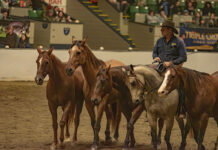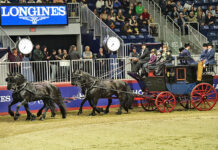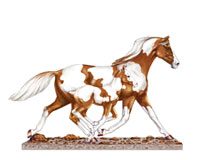 As the nation’s leading organization in advocating our right to ride on public lands, Back Country Horsemen of America believes that education is vital to empowering individuals to enjoy wildernesses while staying safe and having a minimum impact on the land.
As the nation’s leading organization in advocating our right to ride on public lands, Back Country Horsemen of America believes that education is vital to empowering individuals to enjoy wildernesses while staying safe and having a minimum impact on the land.
Through workshops, clinics, seminars, and their websites, BCHA and its state organizations take a proactive approach to making sure folks have the knowledge and understanding they need to both enjoy and take care of our public lands.
Enjoy the Land Safely
The biggest reason BCHA promotes saving trails for horse use is so that we can enjoy the back country as our ancestors did. So, of course, BCHA also seeks to teach other equestrian enthusiasts safe ways to travel by horseback in the wilderness.
One example is the Horse Packing and Wilderness Skills Clinic presented by the High Desert Trail Riders Back Country Horsemen, a chapter of Back Country Horsemen of Oregon, a BCHA state organization. This is the 22nd year for this event, which is one of the largest outdoor and equine educational functions of its kind in the country, seeing more than 4,000 in annual attendance. Following Back Country Horsemen of America’s example of philanthropy, High Desert Trail Riders BCH offers attendance free of charge.
Held at the Klamath County Fairgrounds in early May, this year’s clinic had 50 seminars on the theme of horse health. Several veterinarians and equine health practitioners who are familiar with riding and packing in the back country shared their expertise on a variety of topics. Presenters also discussed general health care for horses; first aid for emergencies; digestive problems and feed considerations for the back country; and the structure, function, and problems of the equine foot.
Other sessions included practical, hands-on instruction on how to administer injections to a horse, wrap a leg bandage, pull a shoe, and use various methods of restraint. Clay hooves were available for those wanting to practice a correct barefoot trim. Top horse and mule trainers covered safe ways to handle and train pack and saddle stock. Over a dozen professional packers demonstrated different methods of packing for travel in the wilderness.
Many other Back Country Horsemen of America state organizations offer lessons and instruction throughout the year in a number of different skills, such as the use of GPS equipment, how to read a map, the best ways to handle the unexpected (like getting lost or parting company with your horse), how to avoid disturbing wildlife in the back country, and even delicious recipes to cook over your campfire.
Back Country Horsemen of Idaho has a very informative education manual available free of charge on their website, www.bchi.org. Useful for a trail rider in any state, topics include trailer safety and hitch capacity, instructions on tying knots, how to cook in a Dutch oven, basic Leave No Trace minimum impact strategies, and pre-trip planning tips.
Trailside First Aid
We love riding out in wilderness lands because they give us escape from development and civilization. But that pleasure comes with a price: it takes us quite a distance away from any veterinarian or hospital. BCHA feels that every rider venturing out in the back country should have at the very least basic human and equine first aid skills so they can handle the most common injuries and emergencies that might happen out on the trail.
BCHA and its state organizations regularly offer workshops of varying length and complexity on handling those situations that you hope will never happen. Human first aid classes include the treatment of burns, sprains, dislocations, shock, hypothermia, dental emergencies, concussion, wounds, and more.
Equine first aid clinics include how to recognize and evaluate a problem with your horse or mule, such as colic, wounds, eye injuries, tack sores, exhaustion, and leg and hoof injures. They also teach participants how to determine a horse’s condition through the assessment of vital signs, listening for intestinal sounds, and testing for dehydration.
Both human and equine first aid seminars include a list of recommended items for your trailside first aid kit and how to use them, ways of improvising found items for medical and veterinary emergencies, and how to make sound decisions in the midst of traumatic circumstances. Having this training is imperative for every back country horseman and might even save the life of your animal or a fellow trail rider.
Be a Good Steward of the Land
BCHA has always sought to share their knowledge and extensive experience of all things pertaining to horse use and the back country. It was only natural that they would become the primary provider of low impact wilderness training to stock users nationally.
Through a formal partnership with their fellow land preservation advocates, the Nine Mile Outdoor Training Center and the Leave No Trace Center for Outdoor Ethics, BCHA conducts a week-long stock users Leave No Trace training program annually. Participants become Leave No Trace Master Educators as they learn how our recreation with horses affects the land and discover practical ways to minimize that impact.
In addition, these Leave No Trace Master Educators host workshops in Leave No Trace principles at their own BCHA state organizations. Some training is held as part of a general meeting, while other workshops take place in someone’s backyard and finish with a hot meal cooked over an open campfire.
Still other BCHA groups take their horses out in the back country and learn how to tie a high line, how to recognize a surface durable enough for camping, and ways to put a campfire out completely. Many BCHA state organizations already have a Leave No Trace Master Educator in their membership; it is BCHA’s goal that every BCHA unit has one.
About Back Country Horsemen of America
BCHA is a non-profit corporation made up of state organizations, affiliates, and at large members. Their efforts have brought about positive changes in regards to the use of horses and stock in the wilderness and public lands.
If you want to know more about Back Country Horsemen of America or become a member, visit their website: www.backcountryhorse.com, call 888-893-5161, or write PO Box 1367, Graham, WA 98338-1367. The future of horse use on public lands is in our hands!






Sounds good.
great article
Thanks for reporting on BCHA! Sounds like a great orhanization!
Sounds good.
interesting
The importance of history and tradition is often lost on new generations of Americans. Maintaining roots to the land and appreciation for it adds depth to our urbanized society. BCH members do their part to contribute to public lands management and responsible use, investing work, persistence, and sincerity.
Not only does BCHA offer learning events and members put in thousands of volunteer hours on trails and horse camps but it is also a great organization to meet new life long friends. Members are made up of both adults with grown children who finally have the time and opportunity to do get out and enjoy their horses and mules and also of parents with kids who like to go trail riding and on work parties as a family.
As the leave No Trace Chairperson for BCH of Washington, I can attest to the “education” part of wilderness travel. We have Master Stock Trainers involved in this process all over Washington State. It is far better to “educate” than to “regulate”. The ethics of LNT are values that apply to everything in life.
good info